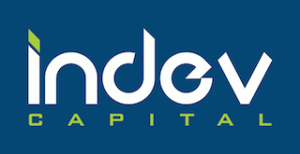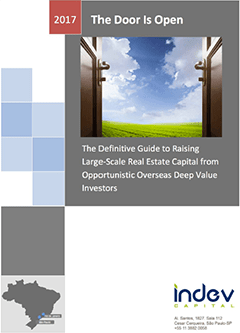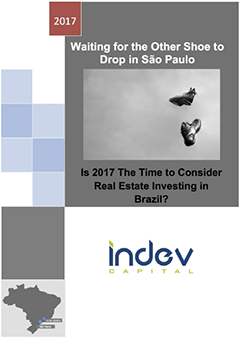
Emerging markets can be considered volatile (negative perception) or opportunistic (positive perception) at certain times of the cycle. It is clearly important to understand the underlying big themes that are driving the market’s behavior and perceived reduction of risk. Undoubtedly, a historic low interest rate in a high cost of capital country is quite significant.
Per our last newsletter about the Pendulum Swinging in the right direction, a critical aspect to Brazil’s real estate asset market recovery is how and why the individual investor returns to the real estate market. For simplification, we will call this gentleman “Uncle Mauricio”.
Purpose of This Newsletter
Brazil’s interest rate and inflation environment has changed quite significantly. In fact, interest rates have reduced to 7% and have dropped 675 bps in 12 months, an all-time historic low, and inflation for the last 12 months until November 2017 was 2.8%, which is almost unheard of in Brazil’s economy. In November of last year, the inflation for the previous 12 months was 6.99%, a drop of 419 bps in 12 months. This is truly significant. In a high cost of capital country, these types of movements, while rare, are not unprecedented. There is a predictable behavior pattern.
How does this change affect the behavior of Ultra-High Net Worth, High Net Worth, and retail investors? Where is this trend in the cycle? How does this affect valuation? How can a global investor take advantage of it? This newsletter will go through these issues. Thanks for reading. OK, if you need coffee, now is the time.
The Search for Yield – Uncle Mauricio Comes Back to São Paulo
 For regular readers of this newsletter, you may remember a friend of ours called “Uncle Mauricio”. This previous newsletter covered the psychology of Brazil’s High Net Worth individual earlier in the cycle. Let’s quickly review! In 2015 inflation in Brazil was 10.67% and core interest rates were 14.25%. In this environment, obviously the real estate market was a standstill.
For regular readers of this newsletter, you may remember a friend of ours called “Uncle Mauricio”. This previous newsletter covered the psychology of Brazil’s High Net Worth individual earlier in the cycle. Let’s quickly review! In 2015 inflation in Brazil was 10.67% and core interest rates were 14.25%. In this environment, obviously the real estate market was a standstill.
So what? Well, if government securities, effectively very low risk of default, paid 10.3% and high quality real estate assets were either below, perhaps equal to, but rarely above this 10.3% yield, this created an environment where the individual investor literally left the real estate market and went to the beach (invested heavily in government securities).
The True Interest Rate Concept → Psychological Analysis of our Uncle Mauricio
In January 2017, NTN, the Brazilian government treasury similar to the US T Bill, was 11.2% nominal per year and inflation was 5.4% per year. As stated above, this equaled a real interest rate, above inflation, of 5.8%. This is still relatively high for Uncle Mauricio, and he would rather purchase government bonds than real estate assets at that time in the cycle. In fact, historically Uncle Mauricio remains at the beach invested in NTN (not real estate) until real interest rates reach at least 3.5% to 4%. His belief to wait until the true interest rate spread gets closer to 3.5% to 4% is based upon recent history and a risk reward profile of Uncle Mauricio to purchase real estate assets.
For example, when real interest rates were last at 3.5% in 2013, there was approximately R$3.7 billion of individual investor capital (this does not include institutional investment, which is much larger) invested in NTN, again, government securities. In 2016, when real interest rates reached 7.64%, the total amount of individual investment in NTN was R$19 billion, a 5X difference. In 2016 Uncle Mauricio was at the beach!!!!!
When he does re-enter the market (guys, he is coming back daily), he will enter with an acquisition and growth and development orientation with a strong focus on top quality assets. Crucially, Uncle Mauricio’s return from the beach and investing again in real estate will define the first sign of the bottom, the recovery, and the path to make a LARGE PILE OF MONEY. If you are a reader of this newsletter based on your being a fan of my humor, great! If you desire to make a large pile of money, even better and keep reading.
Uncle Mauricio’s return will drive the REIT market and, quite frankly, spreads of unique real estate investment opportunities across the market. With government securities now at 10.55% (implicit risk of social security reforms and next year’s election), SELIC at 7%, and inflation at 2.8%, his NTN offers a real yield of 7.75% and SELIC nominal yield of 7%. Uncle Mauricio is back in the market more every day because the tendency of NTN is to go down and most importantly, albeit not priced into government securities quite yet, the perceived risk of real estate is now lower. In addition, this 2.8% inflation number is an all-time low so Uncle Mauricio does not believe that the spread he receives currently on NTN is stable. He believes the real interest rate spread will go lower.
His money soon no longer works for him to invest only in government securities, so what does he do?
A Phone Call in São Paulo
A big secret, or perhaps not so big secret, to Brazil’s inequality is that it is based on a traditional high cost of capital. How does this play out in behavior? Brazil’s wealth is very focused on income-based investments as traditionally those with capital were either helped or hurt radically by the spread between real and nominal interest rates.
When low-risk instruments (NTN as the largest) begin to have less optimal returns than top quality real estate, market behavior changes and it changes pretty rapidly. As we speak, all Uncle Mauricios are calling large brokers like XP Investimentos in a search for yield. These calls are quite urgent.
Simulated Call in São Paulo
Uncle Mauricio – Paulo (his broker), I have my money in LTF (Selic interest rate based instrument) and it pays around 7%. My friend Fabio is investing in real estate funds, should I?
Paulo (Broker) – Yes, Uncle Mauricio, I was about to call you. Income is key for you and currently there are RE Investment Funds (REITS) and REIT IPOs that are offering 6% to 8% yield with a 15% tax shield and corrected by inflation.
A Movie Starts – How Does It Play Out?
 The “texture” and “feel” of the real estate market have started to turn. It’s amazing how, at least on a relative basis (7% interest rates would be a national panic in the US currently), cheap money can change a real estate market :-) . As Uncle Mauricio comes back to the market, there are potentially three phases of the market to evaluate. Obviously, this is the author’s perspective.
The “texture” and “feel” of the real estate market have started to turn. It’s amazing how, at least on a relative basis (7% interest rates would be a national panic in the US currently), cheap money can change a real estate market :-) . As Uncle Mauricio comes back to the market, there are potentially three phases of the market to evaluate. Obviously, this is the author’s perspective.
Phase One → Now Until Approximately June
This period is what I will take the liberty of calling the “thoughtful investor” window. One will find many sponsors taking assets to market via an IPO process, the listing of new debt securities, and large-scale investment banks in Brazil, full of people who can miraculously wear suits in 90º heat and not sweat in the summer, taking various products to market.
Thoughtful investors will isolate on mispricing opportunities. All the strategies listed below have remaining deep value and value investor oriented opportunities.
- Developer Restart Finance
- Lot Subdivision
- Specific SLB of attractive spreads
- Unique Shopping Mall opportunities
- Unique Logistics BTS and SLB Assets with Acquisition Spreads above debt costs
- Niche Sectors
- Data Centers
- Senior Housing
Phase Two → June until Final Election Result – Political Wait-and-See Period
The market is likely to pause during this period. Everyone will pay special attention to the fiscal policy orientation of presidential candidates. Pension reform will be on the top of everyone’s minds. (Actually, some smart insiders think that Pension reform will happen early next year….) As it will literally be suicide for the next president to not tackle this issue, it is highly unlikely that if the economy is moving in the right direction a new president will radically change direction. There is likely still to be an effort to control fiscal spending. However, the retail investor will pause slightly.
Thoughtful investors will double down on any bets made on mispricing opportunities found in the earlier phase.
Phase Three → Post Election – All Clear or Oh *?!# Phase
Once the market determines the next leader is committed to reforms, there will be a significant turn in the market and asset appreciation will start in a rapid and enthusiastic emerging market fashion. This will be an early selling opportunity for those that want a rapid exit and are OK to leave some money on the table.
If the candidate is radical, an electoral accident, there will be a sell-off. In the case of Lula (highly unlikely), there will be an extreme negative reaction; however, similar to his last election, an investor may find a pragmatist Lula could generate significant positive return. Again, if reforms are working as now, it will be extremely difficult to push in the other direction.
It is highly possible that a medium-term hold on opportunities purchased before the election could generate significant returns.
Next Steps
 Brazil’s individual investor is on his or her way back to the market. If value investment is your orientation, it is a nice idea to get a little ahead of this large wave of retail capital.
Brazil’s individual investor is on his or her way back to the market. If value investment is your orientation, it is a nice idea to get a little ahead of this large wave of retail capital.
If you are a thoughtful investor and want to start early in this next cycle, before Uncle Mauricio fully comes back, let’s get on the phone for 15 minutes.
Happy Investing!
Warm Regards,
Joseph Williams
CEO & Founder InDev Capital




